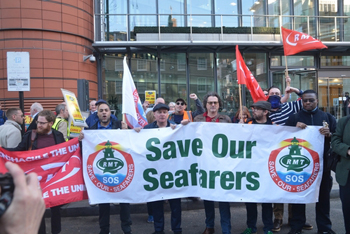Ministers have announced plans for seafarers regularly entering UK ports to be paid the national minimum wage while in UK waters but the proposals have immediately been criticised as inadequate and ‘potentially unworkable’.
The Department for Transport (DfT) called the move a major step forward on pay protection following P&O Ferries’ decision to sack 800 workers and said the Government will consult closely with the ports and maritime sector on the new laws.

A demonstration at P&O's headquarters, March 2022
The new legislation will ban ferries that do not pay their workers the equivalent to minimum wage from docking at UK ports.
Transport secretary Grant Shapps said: ‘We will protect all seafarers regularly sailing in and out of UK ports and ensure they are not priced out of a job. Ferry operators that regularly call at UK ports will face consequences if they do not pay their workers fairly.’
The DfT has launched a consultation, which states: ‘In practice, our intention is that NMWe will enable seafarers within scope to be accorded the same minimum pay for core hours worked whilst in UK waters as those working on domestic services that already qualify for NMW.’
TUC General Secretary Frances O’Grady called the plans ‘feeble and likely unworkable’.
She said: ‘The Government has done nothing to tackle the most flagrant labour abuse in years by P&O. Only stronger employment legislation that boosts worker protections and stops companies firing on the spot will prevent another P&O-type scandal.’
Richard Ballantyne, chief executive at the British Ports Association, said it remains unclear whether the planned legislation will improve long-standing issues for seafarers but that its initial assessment is that it ‘might not be compatible with the UK’s obligations under international treaties or the current principles which governs our independent ports sector’.
He said: ‘The creation of new rules for ports to regulate ships in such a way is unprecedented. Enforcing the minimum wage is not an area where ports have a core competency. This should be a job for the Maritime & Coastguard Agency or HM Revenue & Customs.’
The DfT said the Government is continuing positive bilateral discussions with France, the Netherlands, Spain, Germany, Ireland and Denmark, which aim to ensure that routes between the countries become ‘minimum wage corridors’.
Register now for full access
Register just once to get unrestricted, real-time coverage of the issues and challenges facing UK transport and highways engineers.
Full website content includes the latest news, exclusive commentary from leading industry figures and detailed topical analysis of the highways, transportation, environment and place-shaping sectors.
Use the link below to register your details for full, free access.
Already a registered? Login